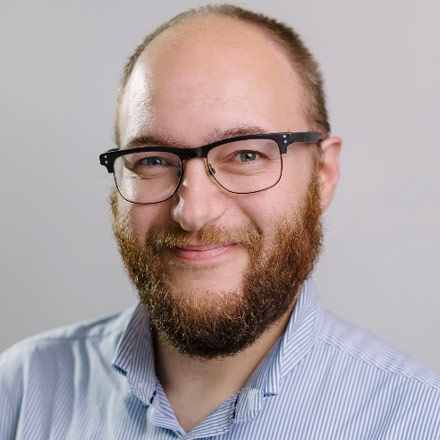Mike Gundry
Current Position: Lecturer in Medical Imaging (Department of Health and Care Professions)
Research Field: Use of AI in x-ray imaging including fracture and dislocation of cervical spine imaging, use of AI in diagnosing bone mineral density (BMD) in x-ray imaging and DXA scanning investigating BMD changes in participant undergoing total knee replacement and total knee revisions (in this case each group was given either a different implant or a different way the implant was implanted).
Why did you decide to undertake clinical academic training and what pathway have you taken so far?
So currently the trials I am involved in at the university is a trial called the OFFER2 IBEX trial, this is a trial investigating if BMD could be determined on single x-ray imaging instead of using the traditional scanning of DXA (dual x-ray absorptiometry) scanning. The idea being that bone density could be determined in single x-rays allowing quicker diagnosis of participants with bone density issues. My pathway was undergraduate to Master by research student helping test and develop Ai in the use for cervical spine imaging, I then undertook and completed my PhD in total knee revision implantation and its impact on BMD scores. I then was part of the team that undertook OFFER1 IBEX, which involved recruiting older participants but with the same goal as the OFFER2 study, but just involving BMD and forearm imaging.

Why did you decide to undertake clinical academic training and what pathway have you taken so far?
So currently the trials I am involved in at the university is a trial called the OFFER2 IBEX trial, this is a trial investigating if BMD could be determined on single x-ray imaging instead of using the traditional scanning of DXA (dual x-ray absorptiometry) scanning. The idea being that bone density could be determined in single x-rays allowing quicker diagnosis of participants with bone density issues. My pathway was undergraduate to Master by research student helping test and develop Ai in the use for cervical spine imaging, I then undertook and completed my PhD in total knee revision implantation and its impact on BMD scores. I then was part of the team that undertook OFFER1 IBEX, which involved recruiting older participants but with the same goal as the OFFER2 study, but just involving BMD and forearm imaging.
Why did you choose to conduct your clinical training at the University of Exeter and what are some of the highlights?
I currently work at the university as a lecturer, but the facilities of the DXA scanner and x-raying imaging allows us to undertake research. Additionally, we have just had a new more powerful DXA scanner installed, and therefore will allow even more precise data collection. Additionally, we work with the RD&E and the location also helps, as out participants for the knee studies also attend x-ray imaging at the RD&E and physio appointments at Heavitree, meaning participants can attend all 3 appointments in one day and within walking distance. As oppose to different locations impacting the chances that participants will attend all appointments. This also helps as we have close ties to the RD&E research team, especially the PEOC orthopaedics team, in which one of the surgeons was one of my PhD supervisors. This team for the knee studies helped recruit and arrange participants. Although it must be stated the RD&E is not involved with either of the OFFER1 or OFFER2 IBEX studies.
What challenges have you faced during your clinical academic training and how have you overcome these?
Balancing teaching and the research, scanning participants at particular times and the issues of attrition e.g. with the knee studies participants were much older with comorbidities so some died during the study, additionally, some participants in the OFFER1 and OFFER2 studies forget about their appointments. We try and address that by reminding the participants closer to the time about their appointment.
What impact has clinical academic training had on your career and what are your next steps?
It has allowed me to develop my skill set from communication to scanning techniques to writing up studies for publications, the experience of performing the research as definitely improved my skill set.
What advice would you give to an aspiring clinical academic?
To contact people at the universities, to start small with collaborations, that being involved with research can be smaller than people realise i.e. reviewing papers for publication, being involved in reviewing grant proposals etc.



